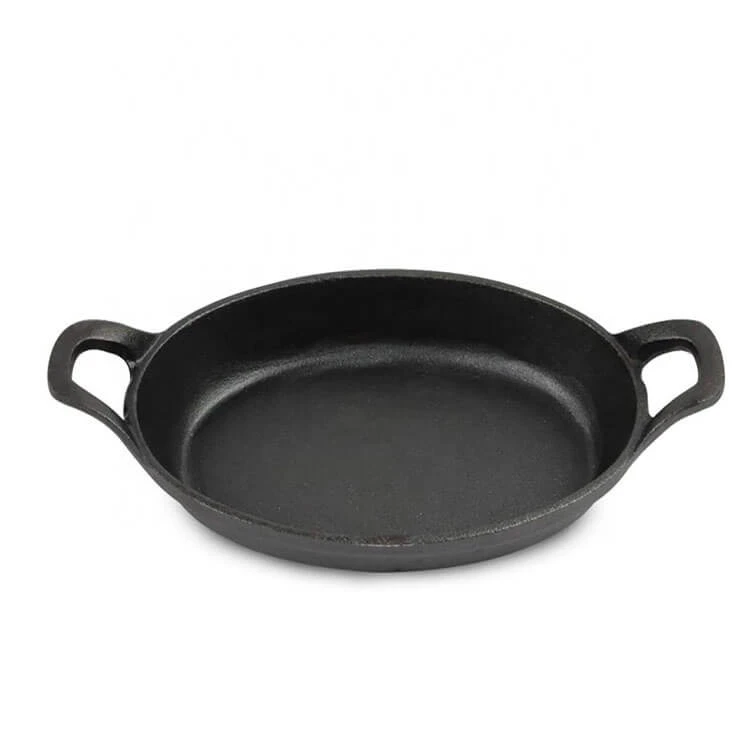
cast iron egg pan
The Versatility and Benefits of Cast Iron Egg Pans
When it comes to cooking breakfast, eggs are often the star of the show. They can be prepared in a variety of ways, from sunny-side-up to scrambled, and each method requires the right tools to achieve the best results. One kitchen tool that has gained considerable attention in recent years is the cast iron egg pan. Known for its ability to distribute heat evenly and retain it for longer periods, a cast iron egg pan is a must-have for anyone who loves cooking eggs to perfection.
Why Choose Cast Iron?
Cast iron cookware has been a staple in kitchens for centuries. Its durability, heat retention, and natural non-stick properties make it an excellent choice for a wide range of cooking tasks. When it comes to cooking eggs, a cast iron egg pan excels in several ways
1. Heat Distribution Cast iron is famous for its ability to heat evenly. This means that you won’t end up with some eggs cooking faster than others. Whether you are frying, poaching, or scrambling, the uniform heat helps ensure every egg is cooked perfectly.
2. Non-Stick Qualities While cast iron requires proper seasoning to develop its non-stick surface, once it is well-seasoned, cooking eggs becomes a breeze. The natural oils absorbed into the pan create a non-stick layer that helps eggs slide out easily, making cleanup less of a hassle.
3. Versatile Cooking Options Beyond just eggs, cast iron pans can handle a variety of cooking techniques including baking, roasting, and sautéing. You can easily transition from frying eggs to preparing a delicious frittata or even baking a cornbread right in the same pan.
4. Longevity With proper care, a cast iron egg pan can last a lifetime, and even generations. This longevity makes it a cost-effective option compared to non-stick pans that may need to be replaced after a few years of use.
Cooking Techniques with a Cast Iron Egg Pan
cast iron egg pan

Using a cast iron egg pan opens up a world of culinary possibilities. Here are a few techniques you can explore
- Sunny-Side-Up Eggs Preheat the cast iron pan over medium heat and add a small amount of oil or butter. Crack the eggs gently into the pan, cover it with a lid, and let them cook until the whites are set while the yolks remain runny.
- Scrambled Eggs For creamy scrambled eggs, whisk together eggs, cream (or milk), salt, and pepper. Heat the pan and add a bit of butter before pouring in the mixture. Stir continuously, allowing the eggs to cook evenly without sticking to the pan.
- Shakshuka This Middle Eastern dish is essentially poached eggs in a spicy tomato sauce. Use your cast iron egg pan to prepare the sauce and then make small wells for the eggs. Cover and let simmer until the eggs are cooked to your desired doneness.
- Frittatas Incorporate vegetables, meats, or cheeses to create a hearty frittata. Start by sautéing your desired fillings in the pan, then pour in the beaten eggs. Transfer the pan to the oven to finish cooking until the top is set and golden.
Care and Maintenance
Taking care of your cast iron egg pan is essential to ensure its longevity and optimal performance. Always avoid using harsh soaps or abrasive scrubbers, as they can strip the seasoning. Instead, clean the pan with hot water and a soft sponge. After washing, dry it thoroughly and apply a light coat of vegetable oil to preserve the seasoning.
Conclusion
A cast iron egg pan is more than just a specialized cooking tool; it is a versatile piece of cookware that enhances your culinary experience. With its ability to cook eggs to perfection, whether fried, scrambled, or baked, it stands out as an essential addition to any kitchen. By investing in a quality cast iron egg pan and treating it with care, you’ll not only enrich your breakfast routines but also create delicious meals that can be enjoyed by family and friends for years to come.
-
Season Cast Iron Perfectly with GPT-4 Turbo TipsNewsAug.01,2025
-
High Quality Cast Iron Cookware - Baixiang County Zhongda MachineryNewsAug.01,2025
-
Premium Cast Iron Pan: Durable & Perfect HeatNewsAug.01,2025
-
High Quality Kitchen Durable Black Round Cast Iron Cookware Pancake Crepe Pan-Baixiang County Zhongda Machinery Manufacturing Co., Ltd.NewsAug.01,2025
-
Cast Iron Cookware - Baixiang County Zhongda Machinery | Nonstick, Heat ResistanceNewsAug.01,2025
-
High Quality Kitchen Durable Black Round Cast Iron Cookware - Baixiang County Zhongda Machinery | Non-Stick, Heat Retention, DurableNewsJul.31,2025


